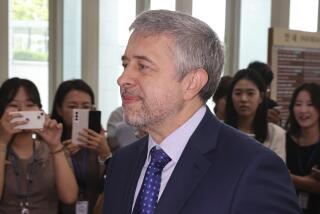Chinese Envoy Briefs U.S. Officials on N. Korean Talks
- Share via
WASHINGTON — With a Chinese diplomat shuttling between North Korea’s Kim Jong Il and Secretary of State Colin L. Powell, Beijing is becoming a key intermediary in the crisis over Pyongyang’s nuclear program.
Vice Foreign Minister Dai Bingguo held talks Friday with Powell and other senior Bush administration officials after a four-day visit to Pyongyang, North Korea’s capital. The administration believes that China’s intensified efforts will increase the chances for a diplomatic solution to a crisis that began in October, when Pyongyang acknowledged pursuing a secret uranium enrichment program.
But Beijing’s diplomacy comes with strings attached: The Chinese are pressuring Washington to show more flexibility toward the North Korean regime, whose leader President Bush has said he “loathes.”
The Chinese are proposing resumption in August of the three-way talks among the United States, Beijing and North Korea that broke down in April after a single round. But the Bush administration is pushing for five-way talks that will include Japan and South Korea, said State Department spokesman Richard Boucher.
“We appreciate the role that China is playing, and we will talk to them thoroughly about how to achieve the multilateral talks that we think are important,” Boucher said Friday. “We believe at this juncture that there should be five-party talks, that Japan and South Korea need to be added to these discussions if they are to achieve any measure of success.”
However, Boucher did not rule out three-way talks.
Talk of renewed negotiations came as the head of the International Atomic Energy Agency, Mohamed ElBaradei, issued a dire warning about the rising stakes.
“The situation in the DPRK is currently the most immediate and most serious threat to the nuclear nonproliferation regime,” ElBaradei said, using the acronym for North Korea’s formal name, the Democratic People’s Republic of Korea.
ElBaradei said in a statement that it was “regrettable that little concrete progress on the issue appears to have been made since December,” when the North kicked out IAEA inspectors who had been monitoring its nuclear facilities. Since then, the North Koreans have claimed to have finished reprocessing enough plutonium for at least six nuclear bombs.
For more than six months, the United States has asked China to use its considerable economic and political leverage to persuade North Korea to halt its nuclear program. China is North Korea’s largest trading partner, supplying about 80% of North Korea’s fuel and much of its food.
China has not imposed any sanctions on North Korea, and refugees continue to cross into China in search of food or jobs. However, China has declared its desire for a nuclear-free Korean peninsula.
This week, Chinese President Hu Jintao sent Dai, the Foreign Ministry official, to Pyongyang bearing a secret message for Kim. Dai spent four days in the North Korean capital and presumably conveyed at least some of what transpired there to Powell and national security advisor Condoleezza Rice. U.S. officials had no comment on the meetings.
Beijing has signaled that it wants Washington to take a softer line on North Korea. Opposing United Nations sanctions, Beijing has not agreed to go along with U.S. plans to interdict North Korean ships carrying missiles or suspected nuclear cargo and has called on Washington and Pyongyang not to further inflame the situation.
“We can’t stiff them now that they’re doing exactly what we asked them to do -- to become involved in the issue -- even though they may not be doing it exactly the way we wanted them to,” said retired Rear Adm. Michael A. McDevitt, a specialist in East Asian security policy.
But a senior administration official said the U.S. views China as more of an interested participant in the meetings than an intermediary. He denied that the administration felt squeezed to accommodate Beijing.
McDevitt said that at a minimum, the U.S. will agree to three-way talks. But whether anything can be accomplished in such a forum is unclear.
The United States is demanding that North Korea commit to an “immediate, verifiable and irreversible” dismantling of its nuclear program. Only then will the United States offer a “grand bargain” of economic and political engagement and expanded humanitarian aid. Many independent North Korea watchers think that stance precludes progress.
Among other issues, the Bush administration is wrestling with the future of the light-water nuclear reactors that are being constructed for North Korea by Japan and South Korea as part of a 1994 deal under which Pyongyang agreed to freeze its nuclear programs in exchange for energy aid.
The U.S. cut off heavy fuel oil shipments that had been its part of the deal last fall, after North Korea’s revelations about its uranium program. But work on the reactor has proceeded, although many administration officials have long criticized the project.
On Friday, the House of Representatives passed an amendment by Rep. Edward J. Markey (D-Mass.) to block any transfers of nuclear material or technology to North Korea. It was the second time the House has passed such an amendment. Prospects for Senate passage are unclear, but if passed, it would prevent South Korea and Japan from continuing with their construction because the reactors are based on an American-owned design that requires U.S. export approval, Markey said.
“While we go to war with Iraq to get rid of nuclear weapons which apparently do not exist, we continue to give the ingredients to develop nuclear weapons to another brutal dictator, Kim Jong Il, in North Korea,” Markey said in a statement. “This two-headed nonproliferation policy must end.”
More to Read
Sign up for Essential California
The most important California stories and recommendations in your inbox every morning.
You may occasionally receive promotional content from the Los Angeles Times.













